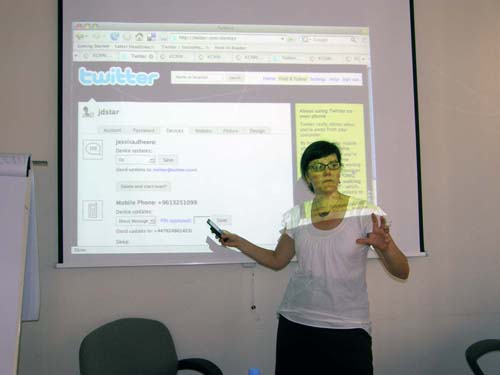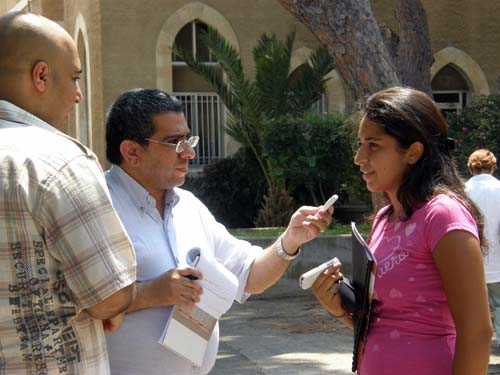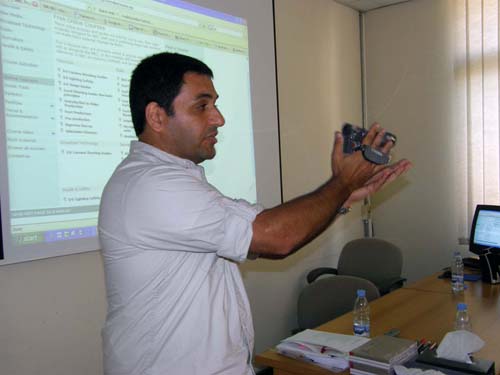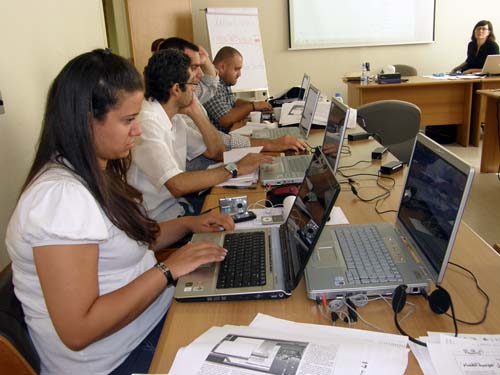Web 2.0, audio and video editing, converged content and online media ethics were a few of the topics tackled in a workshop that drew Arab would-be and regular bloggers seeking to hone their skills in cyber publishing.
Lebanese broadcast journalist and blogger Ibrahim Arab noted in a TV interview available on his site that social media in the Arab World had not evolved adequately, but was proving to be a rather effective means of communication.
"We hope it'll become a mass medium but we need to develop the proper infrastructure in terms of the networking, and of people learning more about blogging," he said.
He argued that Arab journalism should reflect more of what citizens think and want rather than what politicians promote, adding that universities were still not up to par in teaching online journalism.
While Lebanon enjoys a modicum of press freedom, other Arab countries like Egypt, Tunisia, Yemen, Syria and Jordan, to name a few, have clamped down on bloggers, notably those resorting to cyber publishing as a means of dissent again their governments.
"The basic question is how are we going to adapt? My aim is to help you find ways of adapting that work for you," said lead trainer Jessica Dheere of the tips and exercises she presented, adding that there was no one way of producing online content, but rather that bloggers could customize it for their individual use.

Trainer Jessica Dheere sends news on the Internet via mobile phone (Abu-Fadil)
Dheere reviewed the pros and cons of various blogging platforms and discussed case studies illustrating the impact citizen journalism tools like Facebook, YouTube and social media have had on the reporting process in the Arab World and globally.
She said mainstream media had often picked up on stories that first appeared in blogs and social media by shedding more light on them through in-depth coverage they would not have otherwise considered.
"It's our belief that these days there's no journalism that's not online journalism, so it's crucial to extend online training to as many journalists as possible, from cub reporter to veteran correspondent, so that they have an opportunity to fulfill the expectations they have for themselves and their societies," Dheere wrote in a post on e-Sahafa (Arabic for electronic journalism).
She added that with so many non-professionals contributing to the conversation, it was important to share journalism ethics standards, so that professionals and non-professionals alike could develop credibility for their reporting.
"The information was concentrated and important, so I suggest the organization of specialized training in photography, and audio and video editing separately," said Hasan Al Mustafa, a Saudi news producer at Lebanon's LBC Satellite channel.
He was particularly pleased with the hands-on work during the training that allowed participants from Lebanon, Saudi Arabia and Iraq to set up their own blogs, shoot digital pictures and video, work with images and understand file resolution, integrate feeds into their posts, and create multimedia packages for the Web.

Saudi journalists Hasan Al Mustafa and Mansour Al Nogaidan interview
AUB student for their blog (Abu-Fadil)
Trainer Mohammad Najm briefed the journalists on Really Simple Syndication (RSS) feeds, tagging and social bookmarking to make their blogs more effective and more widely accessed.
"You'll see the results as soon as I return to Baghdad," promised Haidar Fadhel Jouda, whose work for the Iraqi civil society Al Amal organization was undoubtedly enriched by his enthusiasm and speed of learning all the latest citizen journalism techniques.
The workshop organized by the American University of Beirut's (AUB) Journalism Training Program (JTP) and sponsored by the German Heinrich Boll Foundation, grouped 10 journalists representing Lebanon's LBC Satellite channel, Iraqi-Lebanese Al Sumariya TV, Voice of Beirut Radio, pan-Arab daily Asharq Al-Awsat, Lebanese business website Nufooz.com, the Iraqi Al Amal organization, Lebanon's Al Mustaqbal daily, Model Iraqi Youth media, and Saudi Arabia's Al Riyadh daily.
According to the BBCBrasil.com's Lebanon correspondent Tariq Saleh who helped with the training, most major international newspaper websites are providing more tools and multimedia options like video, audio, text and photos so that readers/browsers can have access to more comprehensive reports.

BBC's Tariq Saleh demonstrates how to shoot video footage (Abu-Fadil)
Most readers browsing journalists' blogs tend to believe their contents, Saleh said, referring to studies conducted in Brazil and the United States, noting that information available on such sites often surpassed that provided by traditional media.
"As a BBC reporter you don't just write, you make videos, audio, report for TV, so you need the tools," Saleh said, demonstrating the equipment he uses for producing his reports for the BBC's Brazilian audio-visual and online service.
Participants roamed the AUB campus in search of stories, shot footage, took pictures, interviewed summer students, and put together multimedia reports they produced, edited and uploaded onto their blogs for group projects.
They were immersed in technical details and provided with tip sheets on the most effective ways of recording sound, holding cameras while shooting video, and linking to relevant websites.
They were also given a healthy dollop of media ethics in a presentation meant to highlight the pitfalls of speed in online news publishing, questionable sources and unbalanced coverage. Also on tap was a discussion of cyber copyrights.

Carole Sabty is hooked on social media (Abu-Fadil)
"When I shared what I'd learned with my colleagues at work, they thought it was very interesting," said Carole Sabty, an executive producer for highly regarded talk and public affairs programs on LBC's satellite channel.
She said journalists in Lebanon, particularly at LBC, lacked adequate knowledge and skills in online and citizen journalism.
Although well versed in broadcast media, Sabty said 90% of the workshop's content was new to her while 10% was information she already knew but that needed updating.
"I hope the next workshop focuses on 'one-man show (TV) reporters'," she added.